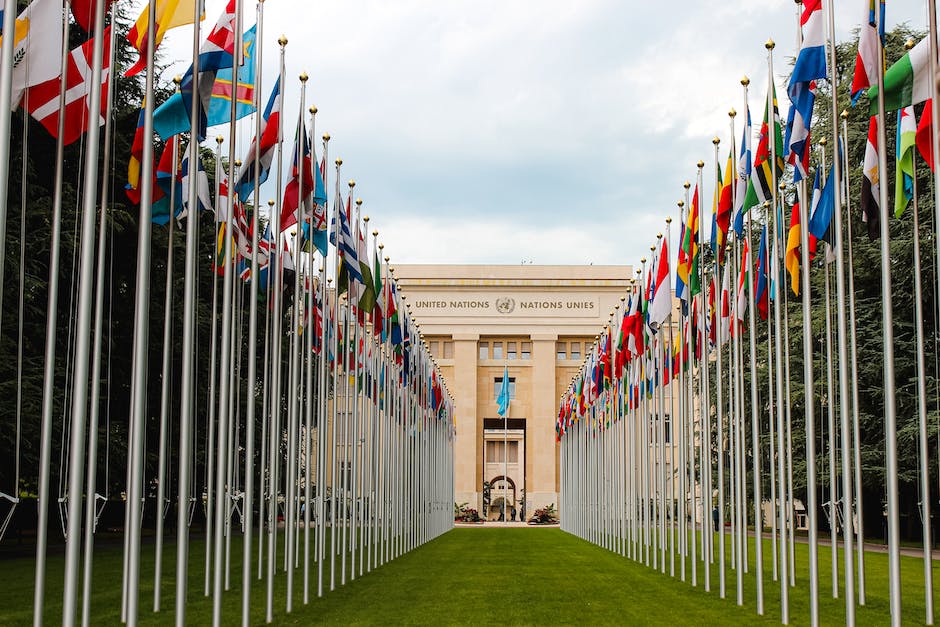Table of Contents
- Introduction
- The Impact of Economic Sanctions on Leadership in the Arab World
- Strategies for Leaders to Navigate Economic Sanctions in the Arab World
- Lessons from Arab Leaders on Dealing with Economic Sanctions
- Exploring Successful Leadership Approaches in Times of Economic Sanctions in the Arab World
- Q&A
- Conclusion
“Unlocking Success Amidst Economic Constraints: Insights from the Arab World”
Introduction
“Navigating Economic Sanctions: Leadership Lessons from the Arab World” is a comprehensive study that delves into the experiences and strategies employed by leaders in the Arab world when faced with economic sanctions. This insightful analysis explores the challenges, successes, and failures encountered by these leaders, providing valuable lessons for navigating economic sanctions in a global context. By examining the Arab world’s approach to economic sanctions, this study offers valuable insights for leaders and policymakers seeking effective strategies to mitigate the impact of sanctions and foster economic resilience.
The Impact of Economic Sanctions on Leadership in the Arab World

The Arab world has been no stranger to economic sanctions throughout its history. From the United Nations sanctions imposed on Iraq in the 1990s to the more recent sanctions on Iran, these measures have had a profound impact on the region’s leadership. Economic sanctions are often used as a tool to pressure governments into changing their policies or behavior. However, the unintended consequences of these sanctions can be far-reaching and have long-lasting effects on the leadership and the people they govern.
One of the key impacts of economic sanctions on leadership in the Arab world is the consolidation of power. When faced with external pressure, leaders often resort to tightening their grip on power to maintain control. This can be seen in countries like Syria, where President Bashar al-Assad used the civil war and the imposition of sanctions as an opportunity to crack down on dissent and solidify his rule. By portraying himself as the defender of the nation against foreign aggression, he was able to rally support and suppress any opposition.
Another consequence of economic sanctions is the erosion of trust between the leadership and the people. When a country is under sanctions, the economy suffers, and the people bear the brunt of the hardship. This can lead to a loss of faith in the government’s ability to provide for its citizens and protect their interests. In countries like Sudan, where economic sanctions have been in place for decades, the lack of economic opportunities and basic services has fueled public discontent and contributed to political instability.
Furthermore, economic sanctions can also lead to the emergence of a black market and illicit activities. When legitimate channels for trade and commerce are cut off, people often turn to illegal means to survive. This can include smuggling, money laundering, and other criminal activities. In countries like Libya, where economic sanctions were imposed in the past, the black market became a thriving industry, further undermining the authority of the government and creating a parallel economy outside of its control.
Leadership in the Arab world also faces the challenge of navigating the complex web of international relations and alliances in the face of economic sanctions. Countries under sanctions often seek support from other nations that are not subject to the same restrictions. This can lead to a realignment of alliances and the forging of new partnerships. For example, Iran, under heavy economic sanctions, has strengthened its ties with countries like Russia and China, who have become important trading partners and sources of investment.
In conclusion, economic sanctions have had a profound impact on leadership in the Arab world. From the consolidation of power to the erosion of trust and the emergence of illicit activities, these measures have shaped the political landscape of the region. Navigating economic sanctions requires strong leadership and the ability to adapt to changing circumstances. It also highlights the importance of addressing the root causes of conflicts and grievances to prevent the need for such measures in the first place.
Strategies for Leaders to Navigate Economic Sanctions in the Arab World
Economic sanctions have become a common tool used by countries and international organizations to exert pressure on nations that violate international norms or engage in activities deemed harmful to global security. The Arab world has not been immune to the impact of economic sanctions, with several countries in the region facing such measures in recent years. Navigating these sanctions requires strong leadership and strategic decision-making. In this article, we will explore some strategies that leaders in the Arab world can employ to effectively navigate economic sanctions.
First and foremost, leaders must prioritize diplomacy and engage in constructive dialogue with the countries imposing sanctions. Open lines of communication can help leaders understand the concerns of the sanctioning nations and work towards finding common ground. By demonstrating a willingness to address these concerns, leaders can potentially mitigate the severity of the sanctions or even have them lifted altogether.
Another crucial strategy is diversifying the economy. Overreliance on a single sector or industry can make a country vulnerable to the impact of sanctions. Leaders should encourage the development of multiple sectors, such as tourism, technology, and agriculture, to reduce dependence on a single source of revenue. This diversification not only strengthens the economy but also provides alternative avenues for growth and resilience in the face of sanctions.
Furthermore, leaders must prioritize the welfare of their citizens during times of economic hardship. Implementing social safety nets and providing support to vulnerable populations can help alleviate the burden of sanctions on the most affected individuals. By demonstrating a commitment to the well-being of their people, leaders can maintain social stability and garner support from their citizens, even in the face of economic challenges.
In addition to domestic measures, leaders should actively seek international partnerships and alliances. By forging strong relationships with other countries, leaders can access alternative markets and sources of investment, mitigating the impact of sanctions. Collaborative efforts with neighboring countries or regional organizations can also provide a platform for collective action and a united front against the sanctions.
Moreover, leaders must invest in education and innovation to build a resilient and adaptable workforce. By equipping their citizens with the necessary skills and knowledge, leaders can foster entrepreneurship and creativity, enabling their countries to thrive even under the constraints of sanctions. Investing in research and development can also lead to the creation of new industries and technologies, further strengthening the economy and reducing the reliance on sanctioned sectors.
Lastly, leaders must maintain a long-term perspective and avoid short-sighted policies. Economic sanctions can be a protracted affair, and leaders must be prepared for the long haul. By developing comprehensive strategies that take into account the potential duration and impact of sanctions, leaders can ensure the continued stability and growth of their countries.
In conclusion, navigating economic sanctions in the Arab world requires strong leadership and strategic decision-making. By prioritizing diplomacy, diversifying the economy, prioritizing the welfare of citizens, seeking international partnerships, investing in education and innovation, and maintaining a long-term perspective, leaders can effectively navigate the challenges posed by economic sanctions. These strategies not only help mitigate the impact of sanctions but also lay the foundation for long-term growth and resilience. As the Arab world continues to face economic sanctions, it is imperative for leaders to embrace these strategies and lead their countries towards a brighter future.
Lessons from Arab Leaders on Dealing with Economic Sanctions
Economic sanctions have become a common tool used by countries and international organizations to exert pressure on nations that violate international norms or engage in activities deemed harmful to global security and stability. The Arab world has not been immune to the impact of economic sanctions, with several countries in the region having faced such measures in recent years. However, amidst the challenges posed by economic sanctions, Arab leaders have demonstrated remarkable resilience and resourcefulness in navigating these difficult circumstances. Their experiences offer valuable lessons in leadership and strategic decision-making.
One key lesson that can be gleaned from Arab leaders is the importance of diversifying the economy. Economic sanctions often target specific sectors or industries, aiming to cripple a country’s economy and force it to change its behavior. Arab leaders have recognized the vulnerability of relying heavily on a single industry, such as oil, and have taken steps to diversify their economies. This diversification not only helps to mitigate the impact of economic sanctions but also promotes long-term economic stability and resilience.
Another lesson that can be learned from Arab leaders is the importance of building strong regional alliances. Economic sanctions can isolate a country from the international community, making it difficult to access essential resources and markets. Arab leaders have responded by strengthening regional cooperation and forming alliances with neighboring countries. By working together, these nations can pool their resources, share expertise, and create alternative channels for trade and investment. This regional solidarity not only helps to mitigate the impact of economic sanctions but also fosters a sense of unity and shared purpose among Arab nations.
Furthermore, Arab leaders have shown the importance of investing in human capital and education. Economic sanctions can disrupt the flow of goods and services, making it difficult for businesses to operate and for individuals to find employment. In response, Arab leaders have prioritized education and skills development, recognizing that a well-educated and skilled workforce is essential for economic growth and resilience. By investing in human capital, Arab nations are better equipped to adapt to changing circumstances and find innovative solutions to overcome the challenges posed by economic sanctions.
Additionally, Arab leaders have demonstrated the importance of effective communication and diplomacy in navigating economic sanctions. Economic sanctions can strain diplomatic relations and create tensions between nations. Arab leaders have recognized the need for open and constructive dialogue with the international community, seeking to find common ground and resolve disputes through peaceful means. By engaging in diplomacy, Arab nations have been able to mitigate the impact of economic sanctions and maintain productive relationships with other countries.
Lastly, Arab leaders have shown the importance of long-term planning and strategic thinking. Economic sanctions can have far-reaching consequences, impacting not only the present but also the future of a nation. Arab leaders have adopted a forward-thinking approach, developing comprehensive strategies to address the challenges posed by economic sanctions. These strategies encompass not only short-term measures to mitigate the immediate impact but also long-term plans to promote economic diversification, strengthen regional alliances, and invest in human capital.
In conclusion, Arab leaders have demonstrated valuable lessons in leadership and strategic decision-making when it comes to navigating economic sanctions. Their experiences highlight the importance of diversifying the economy, building strong regional alliances, investing in human capital, engaging in effective communication and diplomacy, and adopting a long-term planning approach. By learning from these lessons, leaders around the world can better navigate the challenges posed by economic sanctions and promote economic stability and resilience.
Exploring Successful Leadership Approaches in Times of Economic Sanctions in the Arab World
Economic sanctions have become a common tool used by countries and international organizations to exert pressure on nations that violate international norms or engage in activities deemed harmful to global security and stability. The Arab world has not been immune to the impact of economic sanctions, with several countries in the region facing such measures in recent years. However, amidst the challenges posed by economic sanctions, there have been instances of successful leadership approaches that have helped navigate these difficult times.
One such example is the case of the United Arab Emirates (UAE), which faced economic sanctions from neighboring countries in 2017. The UAE’s response to these sanctions provides valuable insights into effective leadership during times of economic hardship. The country’s leaders adopted a multi-faceted approach that focused on diversifying the economy, strengthening diplomatic ties, and investing in human capital.
Diversification of the economy was a key strategy employed by the UAE to mitigate the impact of economic sanctions. The country recognized the need to reduce its reliance on oil revenues and embarked on an ambitious plan to diversify its economy. This involved investing in sectors such as tourism, finance, and technology, which helped create new job opportunities and attract foreign investment. By reducing its dependence on oil, the UAE was able to cushion the blow of economic sanctions and maintain a stable economy.
In addition to diversification, the UAE also focused on strengthening its diplomatic ties with other countries. The country’s leaders recognized the importance of building strong relationships with international partners to counter the effects of economic sanctions. They engaged in diplomatic efforts to foster cooperation and collaboration, which helped attract foreign investment and maintain trade relations. This approach not only helped the UAE weather the storm of economic sanctions but also positioned the country as a regional leader in diplomacy and international relations.
Investing in human capital was another crucial aspect of the UAE’s successful leadership approach during times of economic sanctions. The country recognized that its greatest asset was its people and therefore prioritized education and skills development. By investing in education and training programs, the UAE ensured that its workforce remained competitive and adaptable to changing economic conditions. This not only helped mitigate the impact of economic sanctions but also positioned the country for long-term economic growth and prosperity.
The UAE’s experience with economic sanctions offers valuable lessons for leaders in the Arab world and beyond. Firstly, diversification of the economy is essential to reduce vulnerability to economic sanctions. Relying on a single source of revenue, such as oil, leaves countries exposed to external shocks. By diversifying their economies, countries can create a more resilient and sustainable economic foundation.
Secondly, building strong diplomatic ties is crucial in times of economic sanctions. Engaging in diplomacy and fostering cooperation with other countries can help mitigate the impact of sanctions and maintain trade relations. By positioning themselves as reliable and trustworthy partners, countries can attract foreign investment and maintain economic stability.
Lastly, investing in human capital is vital for long-term economic resilience. By prioritizing education and skills development, countries can ensure that their workforce remains competitive and adaptable to changing economic conditions. This not only helps navigate economic sanctions but also positions countries for long-term economic growth and prosperity.
In conclusion, successful leadership approaches in times of economic sanctions in the Arab world can provide valuable insights for leaders facing similar challenges. The UAE’s experience demonstrates the importance of diversification, diplomatic engagement, and investment in human capital. By adopting these strategies, leaders can navigate the complexities of economic sanctions and position their countries for long-term economic resilience and prosperity.
Q&A
1. What is the book “Navigating Economic Sanctions: Leadership Lessons from the Arab World” about?
The book explores leadership lessons from the Arab world in navigating economic sanctions.
2. Who is the author of “Navigating Economic Sanctions: Leadership Lessons from the Arab World”?
The author of the book is Dr. Karen E. Young.
3. What can readers expect to learn from the book?
Readers can expect to learn about effective leadership strategies in dealing with economic sanctions, drawing insights from the Arab world.
4. Is the book focused solely on the Arab world or does it provide broader insights?
While the book primarily focuses on the Arab world, it also offers broader insights into leadership during economic sanctions that can be applied in other contexts.
Conclusion
In conclusion, “Navigating Economic Sanctions: Leadership Lessons from the Arab World” provides valuable insights into the challenges and strategies employed by leaders in the Arab world when faced with economic sanctions. The book highlights the importance of effective leadership, strategic decision-making, and adaptability in navigating through such difficult circumstances. By examining real-life case studies and drawing lessons from successful leaders, the book offers practical guidance for leaders facing similar situations. Overall, it serves as a valuable resource for understanding the complexities of economic sanctions and the leadership skills required to overcome them.





